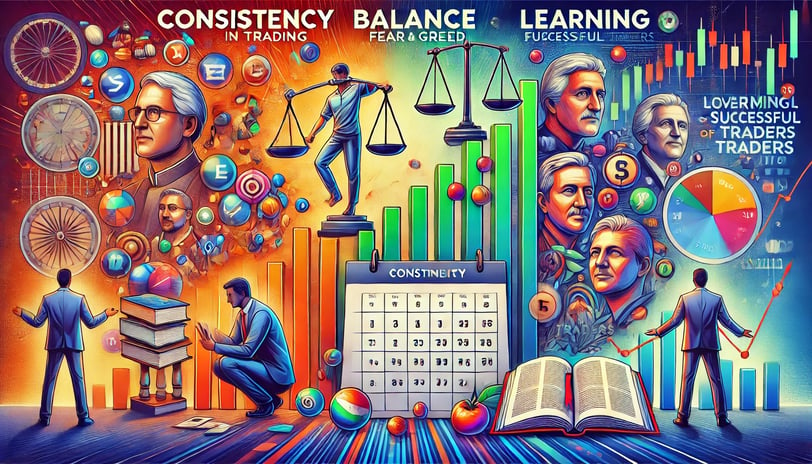Trading Psychology and Motivation
The Emotional Rollercoaster of Trading A couple of years ago, I dipped my toes into trading for the first time. Armed with nothing but a few YouTube tutorials and an app on my phone, I thought, How hard could this be? My first trade was exhilarating—I made a small profit, and for a moment, I felt invincible. But the reality hit when, just a week later, I lost more than half of what I’d gained. I remember staring at my screen, heart pounding, wondering if I’d ever figure this out. That experience taught me something crucial: trading isn’t just about charts, numbers, or strategies. It’s about you. Your emotions, your discipline, and how you handle the unpredictable highs and lows. This blog is a deep dive into trading psychology, focusing on how to stay consistent, overcome fear and greed, and draw inspiration from successful traders.
Ravinder Kumar Sharna
12/8/20243 min read


1. Staying Consistent in Trading
Consistency in trading feels like chasing the horizon—it’s always just out of reach. But over time, I realized it’s not about always winning. It’s about sticking to your plan, even when things go sideways.
I’ll share a mistake I made early on: I had this habit of jumping between strategies. One day I’d follow a moving average crossover strategy, and the next, I’d switch to breakout trading because someone on Instagram said it worked for them. Unsurprisingly, my results were a mess.
What changed? I started journaling my trades. I’d jot down why I entered a trade, how I felt at the time, and what the outcome was. Over weeks, patterns emerged. I saw which strategies worked for me and which ones didn’t. Studies show that maintaining a trading journal improves decision-making and boosts self-awareness (Source: Trading Psychology 101 by Brett Steenbarger).
My takeaway: Pick one strategy, test it on paper for a while, and stick with it. Don’t let every market guru sway your plan.
2. Overcoming Fear and Greed: The Double-Edged Sword
Fear and greed are like the devil and angel on your shoulders while trading. Let’s talk about fear first.
I once hesitated to take a trade because I had just suffered a loss the day before. Even though my analysis screamed, Buy this stock now!, fear whispered, What if you’re wrong again? I didn’t take the trade. The stock soared 10% in a single day.
Fear is often rooted in loss aversion—a psychological bias where the pain of losing feels twice as intense as the joy of winning. According to a study published in the Journal of Economic Perspectives, loss aversion can lead traders to avoid taking risks altogether, even when the odds are in their favor.
On the flip side, greed is just as dangerous. I’ve chased trades long after they’ve reached their peak, thinking, It might go even higher. Spoiler alert: It didn’t. Greed blinds you to reality and makes you forget your exit strategy.
What I’ve learned is to rely on rules rather than emotions. Set stop-losses and take-profit levels before entering a trade. This creates a “safety net” for both fear and greed. And trust me, the discipline pays off.
3. Learning from Successful Indian Traders
One of the most inspiring stories I’ve come across is that of Rakesh Jhunjhunwala, often called the “Warren Buffett of India.” Starting with just ₹5,000, he turned it into a multibillion-dollar portfolio. His journey is a testament to patience, conviction, and learning from mistakes.
Jhunjhunwala once said, “Emotional investment is a sure way to make a loss in stock markets.” That line stuck with me. It reminded me that detachment is key. The market doesn’t care about your feelings, and neither should your trading decisions.
Another inspiring figure is Ashwani Gujral, a seasoned trader and author. In his books, he emphasizes the importance of technical analysis and sticking to your system. His story reassures me that expertise and consistency go hand in hand.
What these traders have in common is resilience. They’ve faced losses but never let them define their journey. Instead, they learned, adapted, and came back stronger.
Takeaway for us beginners? Don’t just follow their trades; follow their mindset. Read their books, watch their interviews, and absorb their lessons.
Conclusion: My Personal Mantra for Trading
Trading has taught me more about myself than I ever expected. It’s not just a financial game—it’s a mental one. The highs can make you feel like a genius, and the lows can humble you in ways you never imagined.
In my opinion, the key to surviving and thriving in this world is to stay grounded. Stick to your plan, learn from every trade (win or lose), and never let emotions take the wheel.
If you’re reading this and thinking, Can I really do this?, my answer is yes. Start small, stay consistent, and treat every trade as a learning opportunity. You don’t have to be perfect—you just have to keep going.
What I’d love for you to take away is this: Trading is a journey, not a race. Keep learning, stay curious, and remember—it’s okay to make mistakes. After all, every great trader started right where you are now.
Happy trading!
